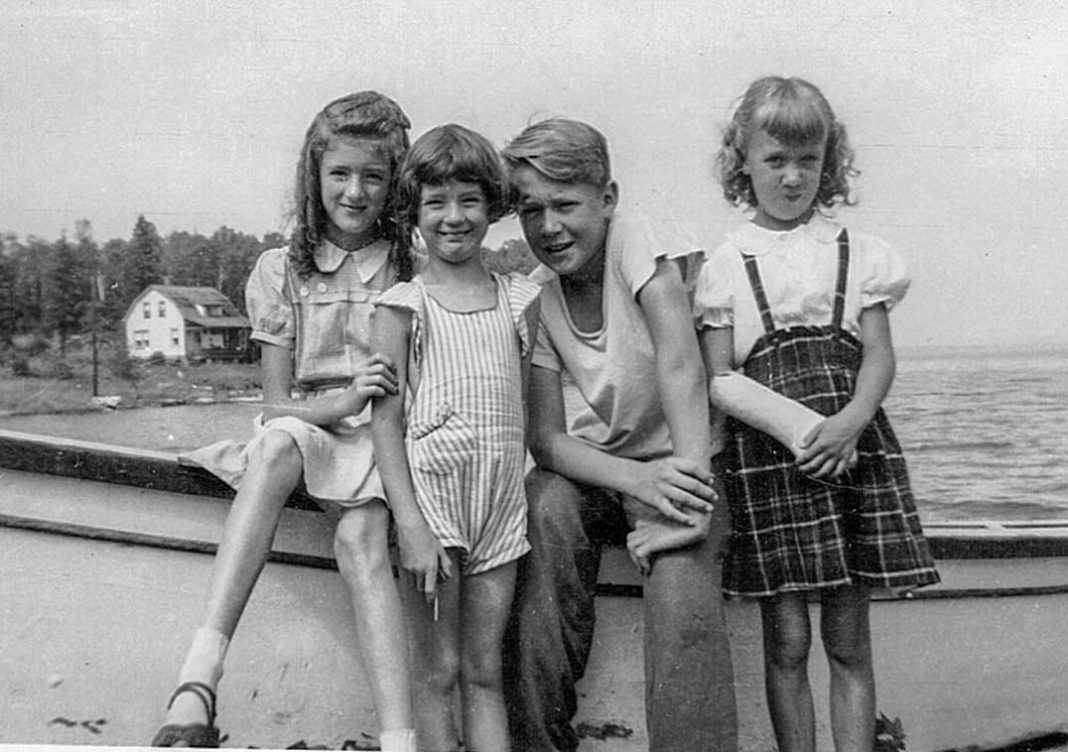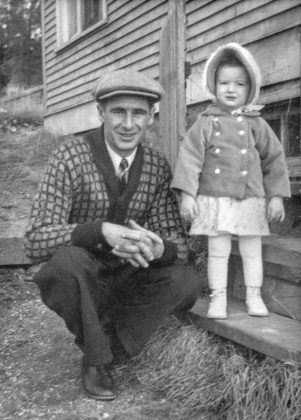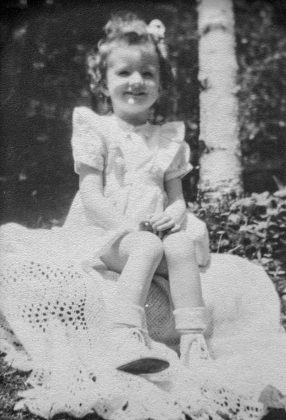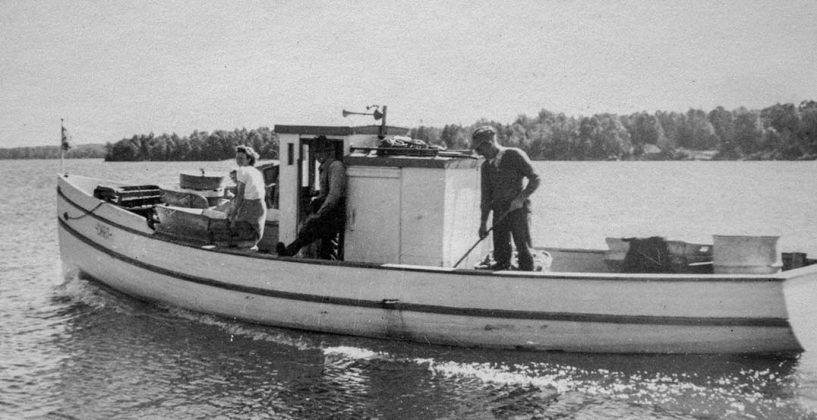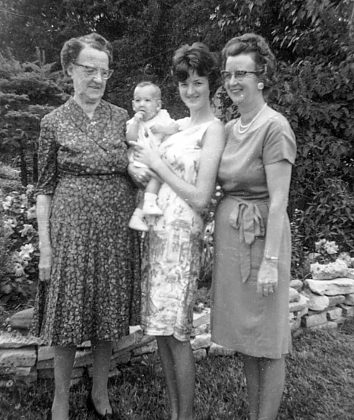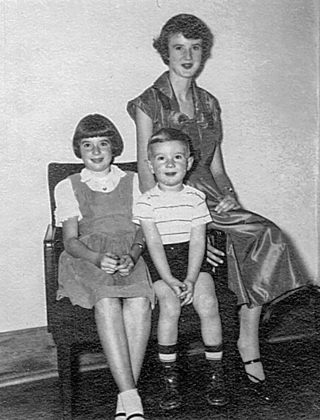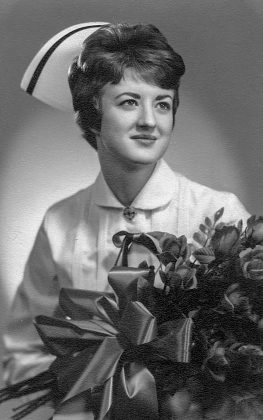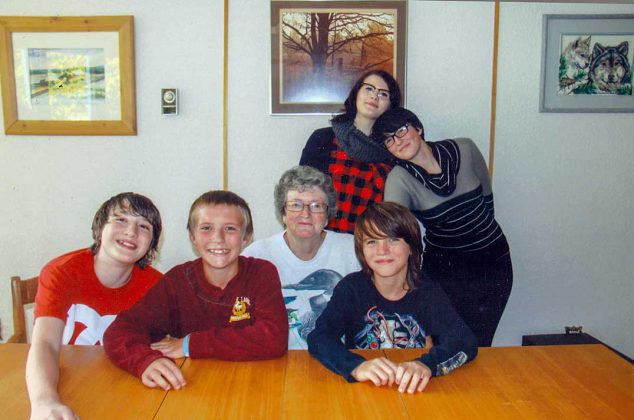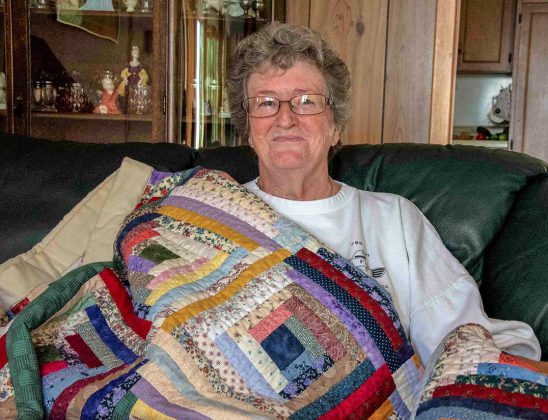Loretta Mucha
South Baymouth is the setting for the idyllic Manitoulin lifestyle that has been the reality of Loretta Mucha. She began her life in Owen Sound, which turned out to not that far from the location of her ancestral roots, firmly dug into Manitoulin’s south shore. Several generations of commercial fishermen are part of her heritage. Today, Loretta lives next to the home she grew up in. As the writer approached the home, the driveway had been reshaped into ‘canyons’ by streams of water from a burst of rain. Living with nature can bring surprises, but most of us would agree that the benefits of living on the Island outweigh any drawbacks.
Both the home and deck boast the elements of the fishing livelihoods that were the backbone of commerce a century ago. An ancient fish box used by her grandfather hugs the rails, a small lighthouse is perched nearby, and the wooden ‘eternal’ fisherman in his yellow slicker and hat, fills the corner. Other charming memorabilia abound. Once inside, the front window features the glistening harbour of South Baymouth, inviting a visitor to linger over the view. Loretta notices the writer is admiring the wooden floor and smiles as she shares, “This floor, polished, still looks like new. My much younger mother pegged each one of those planks to anchor them and they are still perfect today.”
Loretta sits on several United Church committees, helping with fundraising initiatives. She is also the passionate curator of the South Baymouth Museum and she adores her work. “I love history, a gift from the generations before us.” The museum has a complete record, in book-form, of all the obituaries from the Expositor. People come in to find out more about their ancestors and their genealogy. It is so exhilarating when there is an ‘aha’ moment by a family member who has just established a missing link.”
“One lady was in tears when she located a relative she had been seeking for 10 years. Another lady began to cry when she looked at a military display and saw her father. ‘I just buried my dad today,’ she professed sadly. ‘I recently found some war medals belonging to my uncle. Can I bring them here?’ ‘Of course,’ was the response. ‘We are planning a repatriation ceremony with military officers attending. Perhaps you would like to join us? The young lady was extremely pleased with that invitation, and I was elated that we could help her find some closure. These memories are precious for me too.’ Loretta continues to maintain her nursing licence as the resident registered nurse.
“Our family has been researched back to the 1600s. Paternal grandparents, Edward and Agnes (Miller) Greenway, hailed from Collingwood. Agnes’ family were Quakers. They had moved to Canada during the American Revolution. Edward had emigrated from England in 1905 and met Agnes in Collingwood. Edward was a tanner of hides. In 1914, when he was 39, he joined the Canadian Expeditionary Forces, the 20th Battalion. He came back a broken man. He disappeared from the family and died in 1939.”
“Maternal great-grandparents Tom and Charlotte (Mastin) Leeson farmed with their nine children. Their oldest, Martha, was my grandmother. She spent her whole life fishing with her husband William Gelston, son of Mathew and Clara Gelston of Thornberry. Mathew was an engineer on the boats, but he died in an accident at age 37. Grandmother Martha was a gentle loving soul, a peacemaker in the family and she could make a fabulous meal out of ‘nothing’.”
Grandfather William started coming to South Baymouth with his uncle Seth Chapman to fish when he was just 14. Eventually, William bought the home and fishing business from Seth. “One of my first memories is being on the commercial fishing boat with grandfather. He hand-pulled nets of whitefish that would be sold to the Booth Fishing Company who, in turn, took the catch, packed in barrels of ice, to Toronto, New York and Detroit. When the lamprey eels took their toll in 1949, the fishing dried up and grandfather worked for the newly established provincial fishery research centre.”
Dad came to the Island as a deck hand on the Normac at age 16. He became the mate and eventually first mate.’ He met cute little Lillian Gelston at JM Leeson’s store in South Baymouth where he went to buy cigarettes. They dated for two years before they married. Lillian Loretta was born October 9, 1942 in Owen Sound but moved with her family to Manitoulin at five months of age. “I was raised in the white clapboard house next door.”
“My parents and my grandfather would go out on the fishing tug together. My own first-caught whitefish was boiled with potatoes right on the tug. It was so good.” On land, young Loretta loved to play in the net shed while grandfather was mending the nets. “We would get caught up in the nets that had been strung in circles on the big reels to dry. We would spin around in them, occasionally ripping them. Grandfather was not pleased when he had more mending to do.”
Birthdays were always special. “Mother would invite all the local children and make us a big chocolate cake with money wrapped up and hidden inside it. It was exciting to see who had gotten a coin. We all played outside and made our own fun. By the time I was in Kindergarten, dad was ship keeping down south for the Hindman Company. We would stay in Goderich, right on a freighter, tied to two other freighters. I hated school there. I would skip classes to sit on the curb and cry until someone found me and contacted my dad who would come for me.”
“One winter day, I decided to walk home alone despite having to cross the railway track which terrified me. I ran across the tracks and made it to the boat. There was a 75-foot ladder to get up to the deck. I was afraid to stay below all alone, so managed to climb it slowly, all by myself. Then I proudly announced my presence to my horrified mother. “Where’s your father?” she exclaimed. My ‘I don’t know’ propelled her into action. She quickly got up and located him to inform him of my adventure.”
The boats left the docks in March, but the family stayed in an apartment until school was done. “Dad had other work too. He captained a tug boat in Blenheim and he supplied gas companies with specialized equipment for underwater gas wells.”
“SS #4 South Baymouth in Tehkummah was different. I loved school on the Island. The teacher taught all eight grades. There was a vegetable and flower garden which we took care of. Some of our produce and blooms made it to the School Fair in Tehkummah. Prizes were school books.” Once Loretta paired up with Bryan Gleason to sing, ‘It’s a Marshmallow World in the Winter’ and won first prize. Concerts were held at St. Patrick’s Day, Easter, Halloween and Christmas. “Lottie Chapman, my aunt, played piano, taught singing and choreographed our concerts.”
“School lunch breaks in winter often found us skating on the glassy surface of the harbour. Sometimes we had so much fun, we forgot to return. That would annoy the teacher who had to come for us.” Other games that were played were The Fox and the Goose, Red Rover as well as the old stand-by, baseball in summer and fall.
“Our parents would gather at the community hall to play cards and attend fall suppers which meant we would be ‘dragged along’ to help. Tea parties for the church, were held at the Huron Lodge and at Ritchies. We would all dress up and look forward to the fish pond, having our faces painted and other events. My nicest memories are of the activities that were featured in our village. It was a time for sharing, getting to know each other and having fun.”
The research centre would offer nature walks in the area. “We would find things in the bush, like specific plants, birds and other interesting landmarks.” Even now, the museum encourages these visits to the woods. Each year, the schools bring the kids near June break, to enjoy these exploratory walks.
Ivan Harwood, a retired doctor from California who vacations here, had an art class for several years. He always donated his proceeds to the museum. He came as a small child initially, so we always called his family, ‘our American Family’.” “My first job at 13 was washing dishes at the South Baymouth Resort for 50 cents a day. Later, as a nurse, I made $40 a week, less than a restaurant helper at the time, but I loved my work.”
High school, ‘continuation school,’ was in Mindemoya at the Old School building that the town is trying to preserve. “My favourite subject was history. Mr. Bill Dowdell made it come alive, a living thing you could see and feel. This teacher taught drama too, which was just as much fun. I got to play several roles. In one play, I was an old lady being targeted for murder. I spent most of my time on the phone in that tragic performance.”
After high school, in 1960, a lawyer, George Grant of South Baymouth, asked me what I would like to do. I replied, “I want to be a nurse.” He told me that there was only one place to get the best training, The Salvation Grace Army Hospital in Windsor. I decided to follow his recommendations. He also helped me, and other students, get established.”
“I was surprised to learn the old supervisor of the Windsor hospital remembered caring for my grandfather Edward Greenway. She was with him when he died from a cancer of the throat developed from an old war wound sustained in the Boer War of the late 1800s.”
That same year, the Metropolitan store in Windsor exploded from a reported gas leak in the basement. There were about 100 people in the store. Many patients were brought in and all the ‘green’ students had to help. “We worked very hard supplying bandages, transporting, cleaning, sorting equipment, bringing fluids to the patients, and generally assisting where we could. Many patients died that day, but many lived too.”
“I stayed to work there from 1963 to 1998, spending 15 years in the emergency room. I thrived on the fast pace, the challenges that inspired quick creative solutions. These timely decisions helped cement the positive experience overall. It remained my favourite work location.” The ‘three to eleven’ shift was my top choice and I was the only supervisor for this shift in this 325-bed hospital.”
“One staff member said to me, ‘how can you be so cool under pressure?’ I told her, as a nurse you don’t have a right to be anything else. You always do your best and then deal with the emotions later. One time during a hurricane, a sand truck tipped over on a school bus and buried the bus. About 10 children died and they were all brought here to the ‘city’ morgue. That was hard.”
On July 28, 1964, Loretta married Jack Mucha in a quiet family wedding in Windsor. Jack owned a restaurant, Mike’s Grill, with his brother Mike, a place that Loretta had frequented as a student. The reception was held in the restaurant and the couple moved into an apartment above the restaurant.
“Jack was a kind man. If you had money, you paid a fair price. If you didn’t have money, you paid less. Some kids, who had no funds, often left with an ice cream so they wouldn’t stand out among the paying students. I think half the nursing students living on modest means at Grace Hospital visited Mike’s Grill. Luckily, the charitable donations were offset by the generous contributions of the industrial sector that arrived for lunch daily.”
Two children were born, Patty and Jim, and they grew up in Windsor. After Patty’s birth, Loretta took her husband to the Island for the first time. Jack loved it. He was enchanted with the atmosphere and with the fishing. In 1973 Loretta and Jack bought her aunt’s home in South Baymouth and it became their summer home. The kids were still young, seven and eight. “Their births and later my grandchildren’s births are most important to me.”
“I am also proud of my nursing career. To me it was a calling not just a profession. I can count on one hand the number of days I didn’t want to go to work. I missed birthdays and Christmases at home, but I don’t regret my choices in life. I have always spent as much time as possible with my family.”
“I have touched base with relatives from Scotland, England, Wales Australia and Ireland through ancestry.com, which is a great tool for discovering your family tree. We know so much more about our family now.”
“Fall is my favourite time of the year. Things have come full circle. It is down time, time to rest. I was born in the fall when beauty has painted the world with so many colours. ‘Gone with the Wind’ was my favourite movie and Elvis my most-liked singer, especially when he sang the hymns.” Loretta collects depression glass. “It’s all over the house.”
“I grew up with love in the family. At Christmas we always prayed dad would come home safely. There was no tree until he came home from the lakes. Presents always appeared in abundance Christmas morning. My parents had hidden them at the JM Leeson store. We would all get together at Christmas for food and more love.”
Daughter Patty works in the flight service sector at the London International Airport. Today, Patty arrived to visit her mother. She explained her job. “We deal with Flight information, weather briefing, aviation safety,” She is married to Stephen Schliederer who works with her. They have two children, Sarah, an Arts graduate who is working for Bell and Andrew, still in high school in St. Thomas.
Son Jim had his own bowling alley initially, but now he works for a small plant in Harrow where they produce girders, steel for construction and bases for windmills. Wife Wendy works at home. Their three children are Sydney, who is in college and Dylon and Ryan, who are still in high school.
“My strengths? My tenacity. They say I am like a dog with a bone when I start a project. I don’t let go until I have done it to the best of my abilities. What would I still like to do? Go to Ireland. I have been to England, but Ireland has much of my mother’s ancestry living there.” Loretta is also vice president of the South Baymouth Community Development Association, with some 80 members. “We keep the town looking pretty with flowers, benches, banners, tables in parks and we paint the fire hydrants. We also have bake sales and barbeques to raise funds.”
“When I am not working on my quilts, sewn and gifted with love to family and friends, I am working on a history of South Baymouth. This started five years ago from a suggestion that we needed a history of the old houses. I felt we also needed a history of the people in those houses too, so I started by interviewing some of the old timers first. One day soon, I will lay all the information out and get it organized to be typed.”
“My mother was on her own, nine months of the year, while dad was away. She was like a single parent, but she taught us discipline, love and community spirit. She died at 64 in 1982 of cancer. Dad died with an aneurism in 2000 after living a full life. Friends and neighbours shared their memories of our parents, after their death, and those memories were wonderful keepsakes for us.”
“In 1996, I almost died coming up Hwy 69 when a woman passed a truck and ran right into me, totalling my Ranger. The policeman said if I had been in a smaller vehicle, I would have been a statistic. I have no false sense of security, but I relish the simplicity of life here, the security and peace. Life is what you make of it.”
“If I could go back in time, there is nothing I would change. I learned much from dad who was a rock. He taught me to help others. He would collect elders’ mail, take their garbage out, or buy groceries and then stop in the nursing home to visit friends living there.”
“Manitoulin is our refuge, our sanctuary. I never cut my umbilical cord with the Island. I left at 17 to train for my career and I always knew I would come back. Since 2000, I have been a permanent resident. Jack and I divorced but we remained good friends and both of us had homes here until Jack died five years ago. The grandchildren would check out both places and decide who had the best meal cooking that day. Patty and Jim had their first jobs here. This place is their anchor too. I live in the house my mum and dad built when dad retired and these days, a ‘found’ cat has adopted me. He looks warily at strangers, perhaps to guard me. There is no place like Manitoulin out there. This really is a great place to live.”

